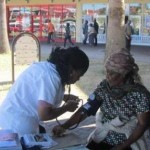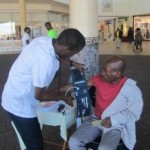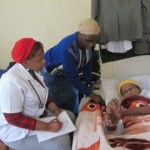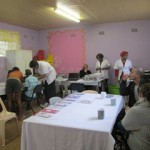Ukuba Nesibindi Homoeopathic Clinic
Kenneth Gardens Homoeopathic Community Clinic
Ukuba Nesibindi Homoeopathic Clinic
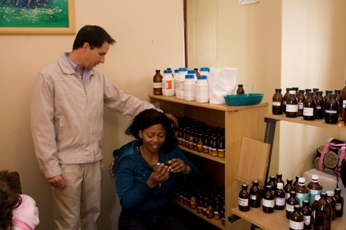 In order to facilitate higher standards of healthcare, as well as in teaching and learning, the Ukuba Nesibindi Homoeopathic Clinic (UNHC) was established as the first of its kind amongst the homoeopathic satellite clinics in the greater Durban region. In active collaboration with Lifeline, the main objective of this busy community clinic was to introduce an alternative, cost effective, safe and gentle form of treatment to improve the lives of the people in the area; as well as to provide the students with a crucial practical foundation and a clinical environment in which to apply their theoretical knowledge.
In order to facilitate higher standards of healthcare, as well as in teaching and learning, the Ukuba Nesibindi Homoeopathic Clinic (UNHC) was established as the first of its kind amongst the homoeopathic satellite clinics in the greater Durban region. In active collaboration with Lifeline, the main objective of this busy community clinic was to introduce an alternative, cost effective, safe and gentle form of treatment to improve the lives of the people in the area; as well as to provide the students with a crucial practical foundation and a clinical environment in which to apply their theoretical knowledge.
Like the other satellite clinics which soon followed it, UNHC provides free homoeopathic primary healthcare services at the Lifeline building in Warwick junction, a primarily disadvantaged area noted for its highly impoverished people and substandard living conditions. UNHC is run exclusively by the current 4th and 5th year homoeopathic students under the close supervision of a qualified homoeopathic practitioner, and is funded totally by the Department of Homoeopathy. Over the years of engaging with this clinic, the UNHC has revealed to the students, staff and the university as a whole, that community engagement serves as a bridge in the acquisition of knowledge and greater awareness of the social realities of our time. It is because of this, that community engagement has become a form of expression for the Department of Homoeopathy – particularly in the promotion of democratic citizenship; widening educational and social development, and in the advancement of the greater public good.
Kenneth Gardens Homoeopathic Community Clinic
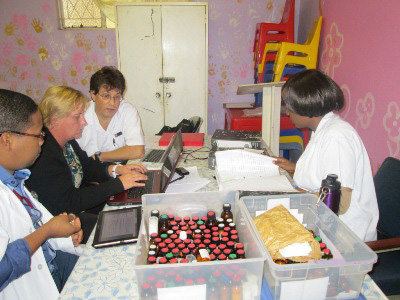 The Kenneth Gardens Homeopathic Community Clinic was established in 2012 in collaboration with the University of Kwa-Zulu Natal, and is regarded as the ‘’baby’’ and newest addition amongst the other satellite clinics which fall under the ambit of the Department of Homoeopathy.
The Kenneth Gardens Homeopathic Community Clinic was established in 2012 in collaboration with the University of Kwa-Zulu Natal, and is regarded as the ‘’baby’’ and newest addition amongst the other satellite clinics which fall under the ambit of the Department of Homoeopathy.
The setting of this exciting community clinic is very unique, as it is based in a housing estate for the medically boarded. The clinic is operated on a weekly basis by the 5th year homoeopathy students under the careful guidance and supervision of a qualified clinician. It is here at the clinic, that the homoeopathic students get to perform an integral function in community services and outreach through the conducting of physical examinations, case taking, and the subsequent treatment and dispensing of homoeopathic medicines to those in need.
The Kenneth Gardens Clinic is very vibrant and has an open and free exchange with certain members of the community, particularly the Senzokuhle (a home-based care organisation), who assist with the administration and translation aspects at the clinic site. Perhaps one of the many highlights at this clinic is that the students get to go on ‘’home visits’’ to patients that are unable to reach the clinic due to severe illness or disabilities. The students really enjoy these individual consultations in such intimate settings, as they begin to appreciate and better understand the circumstances surrounding their patients and the nature of their ailments.
The Kenneth Gardens Homoeopathic Community Clinic is gives students a taste of the immense responsibilities involved in acting as primary health care practitioners in the management of their patients’ health and wellbeing. Such interaction is often daunting for the students at first, but the resultant outcomes after such service gives them a sense of accomplishment and confidence in better handling their own patients in the near future. The community has really welcomed the initiative, and the students are really accepted as being a part of the community, especially for the important function that they deliver as health care providers.
From a lecturer’s point of view, it is heartening to know that what you are doing is successful when students volunteer to offer their services at the clinic during the holidays and you have a waiting list develop! This shows that the clinic is exciting and somewhere where the students want to go to learn, as well as offer their unique abilities and expertise to uplift the community as an entirety.

